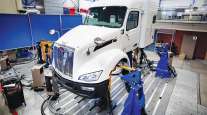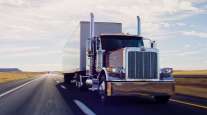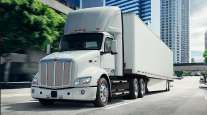Staff Reporter
Einride Becomes Peterbilt’s Biggest BET Customer
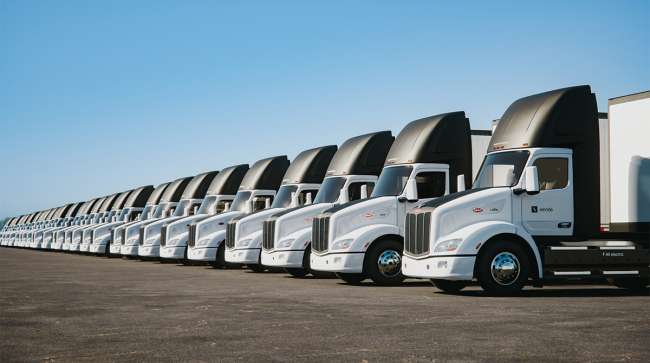
[Stay on top of transportation news: Get TTNews in your inbox.]
Einride will buy 150 Model 579EV battery-electric trucks from Peterbilt, the truck maker’s biggest EV order so far, the companies said.
Stockholm-headquartered Einride, more commonly known as an autonomous electric vehicle pioneer, plans to use the day cab tractors in its regional haul trucking-as-a-service (TaaS) business.
Einride’s 579EV deliveries are set to start in late 2024, with a scaling up of shipments in 2025, Niklas Reinedahl, Einride general manager North America, told Transport Topics on May 31. Deliveries will increase annually thereafter, he added.
Reinedahl said Einride expects to scale up its purchases from Peterbilt beyond the initial 150 trucks as the Paccar unit increases production of battery-electric trucks.
Einride began offering TaaS with heavy-duty rigs in Europe four years ago and then launched operations in the U.S. 2½ years ago.
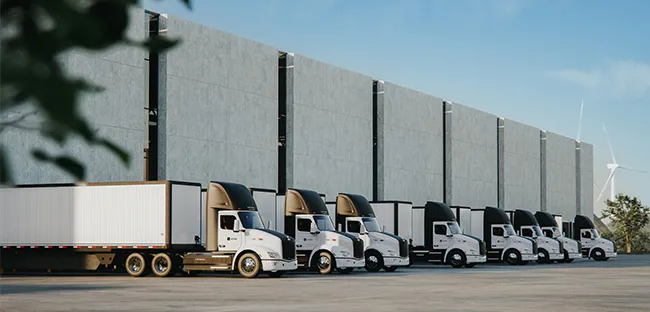
Einride’s 579EV deliveries are set to start in late 2024, with a scaling up of shipments in 2025. (Peterbilt)
Until now, the U.S. TaaS operations have used Class 8 BYD 8TT trucks, with the third-generation BYD trucks typically using range extenders. In 2022, Einride ordered 200 BYD 8TTs, with the extended range day cab offering a working range of 200 miles per charge, according to the truck maker.
In Europe, Einride has worked with Daimler Truck’s Mercedes-Benz trucks unit, deploying the eActros model; Paccar’s DAF unit; and Traton’s Scania subsidiary.
The company’s TaaS customer base in the U.S. is now into double figures, Reinedahl said, with some of those client relationships spanning both the U.S. and Europe. Overall, the company has 30 TaaS customers in Europe and the U.S., he added.
PepsiCo Inc. is a customer in the U.S., the United Kingdom and Germany. PepsiCo ranks No. 1 on the Transport Topics Top 100 list of the largest private carriers in North America. Einride is operating in eight U.S. states on 3,000 lanes. Einride typically offers five-year TaaS contracts. The contracts are on a take-or-pay basis.
While operating the BYD trucks, Einride gained a great deal of U.S. electrification experience, Reinedahl said. “We’ve reached a point where you don’t have any concerns with the equipment,” he said. Einride managed an uptime rate of 97% over the past three years, equivalent to that of diesel rigs, he said.
Einride operates 250 charging stations in the U.S. Einride and Peterbilt plan to have a dedicated team available to help identify the best EV configuration for customer operations, locate available incentives, and aid charging and infrastructure solutions.
In March, Einride opened its largest charging facility yet. The Lynwood site in Los Angeles County has 65 charging stations and can service 200 heavy-duty trucks per day.
We're fully energized after the fantastic grand opening of Einride's first US Smartcharger Station in Lynwood, California. Thank you to all attendees for taking part in this moment. It was electric! ⚡️ pic.twitter.com/nEsq4ziHkn — Einride (@einrideofficial) April 25, 2024
The facility will initially serve Einride TaaS fleets, including global shipping giant A.P. Moller-Maersk, but the company expects to make the site available more widely, it said when announcing the launch.
Maersk ranks No. 5 on the Transport Topics Top 50 list of the largest global freight carriers.
Einride also works with GE Appliances, DB Schenker, Bridgestone Americas, Electrolux, Lidl, Mars, AB InBev and Heineken.
Reinedahl — who previously worked for Volvo Construction Equipment and joined Einride when it only had 15 employees — said the company offers a turnkey freight-capacity-as-a-service solution, providing customers with electric vehicles, charging infrastructure and access to Einride Saga, the company’s digital freight platform.
“The U.S. trucking industry’s value chain is highly underutilized,” he said. “We can move more goods with much less trucks.”
Overall equipment efficiency is the key metric for Einride regarding battery-electric trucks rather than total cost of ownership, he said, which its digital freight platform enables.
Some 50%-60% of the regional hauling business in the U.S. can be electrified, he said, adding that the electrification of the regional haul sector is scalable already.
The human factor is the greatest variable in operations, Reinedahl said, adding that there can be a 40% difference in efficiency between drivers of battery-electric trucks.
Want more news? Listen to today's daily briefing below or go here for more info:


